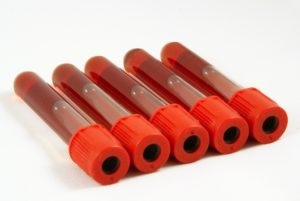Taking Blood
If your doctor decides it is necessary for you to have blood taken and this has been difficult for you in the past, explain the problem to them and give them the separate letter we have prepared for them.
We have provided information below on Giving Blood More Easily.

Giving Blood More Easily
If your doctor still thinks it is necessary to take blood from you, having the most experienced person to carry out the procedure will make it easier for you.
This could be:
- The most experienced person in the practice; health care assistant, nurse or doctor
- A phlebotomist (person whose job it is to take blood) in a hospital
- The children’s unit in the hospital where the staff members are used to taking blood from patients who find it difficult or distressing.
- An anaesthetist.
As well as taking from the arm, blood can be taken from the feet or legs and even from the groin or neck if necessary. To help the person taking the blood ‘see the vessels’ in the trickier area they may want to use ultrasound, which may need to be arranged in advance. Alternatively the Vein Viewer - a hand held device using near infra red light - can be loaned from the Trust to those living in the UK
When you meet the person who is going to take your blood, you can help by:
- suggesting sites where blood has been obtained before
- explaining how it was done
There could be a better site though, and the person taking the blood will explain this to you before continuing.
Some doctors will prescribe you an anaesthetic cream if you would like one. This will numb the skin. Your doctor or pharmacist will explain exactly when and how to apply it. You will need to arrange this before you go to have your blood taken, as it will need to be applied beforehand. It is important that your limbs are warm when you have the blood taken, so if it is a cold day wrap up warm.
To minimize any discomfort, the person taking the blood may use a paediatric needle or a small needle attached to a thin flexible tube called a butterfly needle; they may also use paediatric containers requiring smaller amounts of blood.
Remember, healthcare professionals will understand any concerns you may have about having blood taken, so tell them. If you find it hard to talk about, write it down for them to read during your consultation.
If your doctor is considering prescribing new medication for you which could involve regular blood monitoring by blood test, remind your doctor of your problem as there may be an alternative medication that could be prescribed instead.
Points to remember
- Explain your problem to your doctor
- Decide with your doctor who will take your blood
- Ask for an anaesthetic cream if you would like to use one
- Help choose the best site with the person taking the blood
- Make sure you are warm on the day
- Ask for medicines which don’t require blood tests
Contact Us
If you need further information please contact the Trust medical advisers on 01480 474074 or by email.
You can also download this information as a factsheet.
Taking Blood